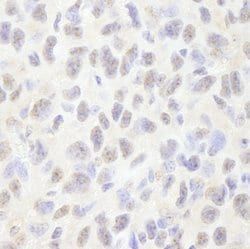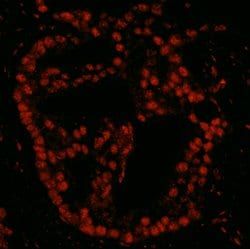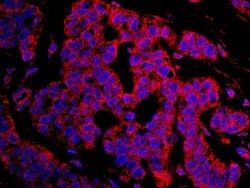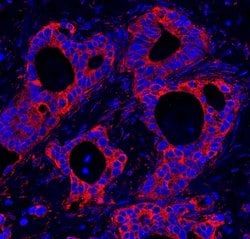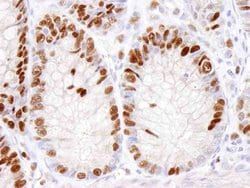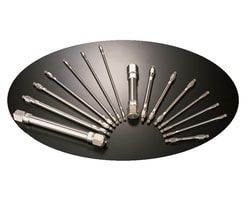50-157-1312
EGFR Polyclonal Antibody, Bethyl Laboratories
Manufacturer: Fischer Scientific
Select a Size
| Pack Size | SKU | Availability | Price |
|---|---|---|---|
| Each of 1 | 50-157-1312-Each-of-1 | In Stock | ₹ 12,384.35 |
50-157-1312 - Each of 1
In Stock
Quantity
1
Base Price: ₹ 12,384.35
GST (18%): ₹ 2,229.183
Total Price: ₹ 14,613.533
Antigen
EGFR
Classification
Polyclonal
Formulation
TBS with 0.1% BSA and 0.09% sodium azide
Gene Accession No.
P00533, Q01279
Gene Symbols
EGFR
Immunogen
Between 1150 and C-term
Quantity
10 μL
Primary or Secondary
Primary
Target Species
Human, Mouse
Product Type
Antibody
Isotype
IgG
Applications
Immunofluorescence, Immunohistochemistry
Conjugate
Unconjugated
Gene
EGFR
Gene Alias
ERBB, ERBB1, HER1, PIG61, mENA, avian erythroblastic leukemia viral (v-erb-b) oncogene homolog, cell growth inhibiting protein 40, cell proliferation-inducing protein 61, proto-oncogene c-ErbB-1, receptor tyrosine-protein kinase erbB-1, epidermal growth f
Host Species
Rabbit
Purification Method
Antigen affinity chromatography
Regulatory Status
RUO
Gene ID (Entrez)
13649, 1956
Content And Storage
4° C
Form
Liquid
Description
- The recommended shelf life for this product is 1 year from date of receipt
- Based on 100% sequence identity, this antibody is predicted to react with Monkey, Gorilla, Chimpanzee, Northern white-cheeked gibbon, Crab-eating macaque and White-tufted- EGFR (Epidermal growth factor receptor, HER1, ErbB1) is encoded by the EGFR gene located on chromosome 7 in humans
- EGFR belongs to the HER/ERbB family of proteins that includes three other receptor tyrosine kinases, ERbB2, ERbB3, ERbB4
- EGFR is a transmembrane receptor and binding of its cognate ligands such as EGF (Epidermal Growth Factor) and TGF alpha (Transforming Growth Factor alpha) to the extracellular domain leads to EGFR dimerization followed by autophosphorylation of the tyrosine residues in the cytoplasmic domain
- Phosphorylation of EGFR at certain residues is also mediated by Src-non-receptor kinase
- EGFR activation signals multiple downstream signaling cascades such as the Ras - ERK, PI3-K - Akt, Jak - STAT and PKC pathways that help in growth and proliferation of cells
- Phosphorylation of EGFR at Y1086 specifically allows binding of the adaptor protein GRB2, leading to activation of the MAPK pathway
- Upon receptor activation and signaling, EGFR is endocytosed and targeted for degradation or recycling
- Mutations in the EGFR gene are associated with lung cancer and multiple alternatively spliced transcript variants encode different protein isoforms of EGFR have been found
- Increased production or activation of EGFR has been associated with poor prognosis in a variety of tumors
- Moreover, EGFR overexpression is observed in tumors of the head and neck, brain, bladder, stomach, breast, lung, endometrium, cervix, vulva, ovary, esophagus, stomach and in squamous cell carcinoma.
Compare Similar Items
Show Difference
Antigen: EGFR
Classification: Polyclonal
Formulation: TBS with 0.1% BSA and 0.09% sodium azide
Gene Accession No.: P00533, Q01279
Gene Symbols: EGFR
Immunogen: Between 1150 and C-term
Quantity: 10 μL
Primary or Secondary: Primary
Target Species: Human, Mouse
Product Type: Antibody
Isotype: IgG
Applications: Immunofluorescence, Immunohistochemistry
Conjugate: Unconjugated
Gene: EGFR
Gene Alias: ERBB, ERBB1, HER1, PIG61, mENA, avian erythroblastic leukemia viral (v-erb-b) oncogene homolog, cell growth inhibiting protein 40, cell proliferation-inducing protein 61, proto-oncogene c-ErbB-1, receptor tyrosine-protein kinase erbB-1, epidermal growth f
Host Species: Rabbit
Purification Method: Antigen affinity chromatography
Regulatory Status: RUO
Gene ID (Entrez): 13649, 1956
Content And Storage: 4° C
Form: Liquid
Antigen:
EGFR
Classification:
Polyclonal
Formulation:
TBS with 0.1% BSA and 0.09% sodium azide
Gene Accession No.:
P00533, Q01279
Gene Symbols:
EGFR
Immunogen:
Between 1150 and C-term
Quantity:
10 μL
Primary or Secondary:
Primary
Target Species:
Human, Mouse
Product Type:
Antibody
Isotype:
IgG
Applications:
Immunofluorescence, Immunohistochemistry
Conjugate:
Unconjugated
Gene:
EGFR
Gene Alias:
ERBB, ERBB1, HER1, PIG61, mENA, avian erythroblastic leukemia viral (v-erb-b) oncogene homolog, cell growth inhibiting protein 40, cell proliferation-inducing protein 61, proto-oncogene c-ErbB-1, receptor tyrosine-protein kinase erbB-1, epidermal growth f
Host Species:
Rabbit
Purification Method:
Antigen affinity chromatography
Regulatory Status:
RUO
Gene ID (Entrez):
13649, 1956
Content And Storage:
4° C
Form:
Liquid
Antigen: MCM2
Classification: Polyclonal
Formulation: TBS with 0.1% BSA and 0.09% sodium azide
Gene Accession No.: P49736, P97310
Gene Symbols: MCM2
Immunogen: Between 1 and 50
Quantity: 100 μL
Primary or Secondary: Primary
Target Species: Human, Mouse
Product Type: Antibody
Isotype: IgG
Applications: Immunofluorescence, Immunohistochemistry
Conjugate: Unconjugated
Gene: MCM2
Gene Alias: minichromosome maintece complex component 2
Host Species: Rabbit
Purification Method: Antigen affinity chromatography
Regulatory Status: RUO
Gene ID (Entrez): 17216, 4171
Content And Storage: 4° C
Form: Liquid
Antigen:
MCM2
Classification:
Polyclonal
Formulation:
TBS with 0.1% BSA and 0.09% sodium azide
Gene Accession No.:
P49736, P97310
Gene Symbols:
MCM2
Immunogen:
Between 1 and 50
Quantity:
100 μL
Primary or Secondary:
Primary
Target Species:
Human, Mouse
Product Type:
Antibody
Isotype:
IgG
Applications:
Immunofluorescence, Immunohistochemistry
Conjugate:
Unconjugated
Gene:
MCM2
Gene Alias:
minichromosome maintece complex component 2
Host Species:
Rabbit
Purification Method:
Antigen affinity chromatography
Regulatory Status:
RUO
Gene ID (Entrez):
17216, 4171
Content And Storage:
4° C
Form:
Liquid
Antigen: __
Classification: __
Formulation: __
Gene Accession No.: __
Gene Symbols: __
Immunogen: __
Quantity: __
Primary or Secondary: __
Target Species: __
Product Type: __
Isotype: __
Applications: __
Conjugate: __
Gene: __
Gene Alias: __
Host Species: __
Purification Method: __
Regulatory Status: __
Gene ID (Entrez): __
Content And Storage: __
Form: __
Antigen:
__
Classification:
__
Formulation:
__
Gene Accession No.:
__
Gene Symbols:
__
Immunogen:
__
Quantity:
__
Primary or Secondary:
__
Target Species:
__
Product Type:
__
Isotype:
__
Applications:
__
Conjugate:
__
Gene:
__
Gene Alias:
__
Host Species:
__
Purification Method:
__
Regulatory Status:
__
Gene ID (Entrez):
__
Content And Storage:
__
Form:
__
Antigen: MCM2
Classification: Polyclonal
Formulation: TBS with 0.1% BSA and 0.09% sodium azide
Gene Accession No.: P49736, P97310
Gene Symbols: Mcm2
Immunogen: Between 1 and 50
Quantity: 10 μL
Primary or Secondary: Primary
Target Species: Human, Mouse
Product Type: Antibody
Isotype: IgG
Applications: Immunofluorescence, Immunohistochemistry
Conjugate: Unconjugated
Gene: MCM2
Gene Alias: minichromosome maintece complex component 2
Host Species: Rabbit
Purification Method: Antigen affinity chromatography
Regulatory Status: RUO
Gene ID (Entrez): 17216, 4171
Content And Storage: 4° C
Form: Liquid
Antigen:
MCM2
Classification:
Polyclonal
Formulation:
TBS with 0.1% BSA and 0.09% sodium azide
Gene Accession No.:
P49736, P97310
Gene Symbols:
Mcm2
Immunogen:
Between 1 and 50
Quantity:
10 μL
Primary or Secondary:
Primary
Target Species:
Human, Mouse
Product Type:
Antibody
Isotype:
IgG
Applications:
Immunofluorescence, Immunohistochemistry
Conjugate:
Unconjugated
Gene:
MCM2
Gene Alias:
minichromosome maintece complex component 2
Host Species:
Rabbit
Purification Method:
Antigen affinity chromatography
Regulatory Status:
RUO
Gene ID (Entrez):
17216, 4171
Content And Storage:
4° C
Form:
Liquid

